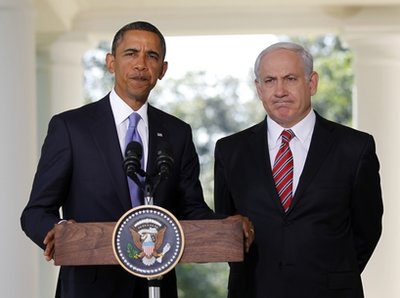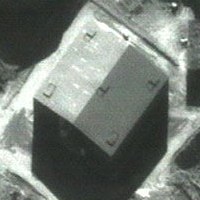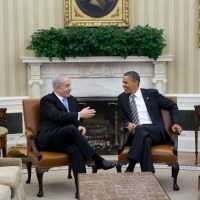![]()
Thu, Sept 02, 2010 | The Rubin Report | By Barry Rubin

President Barack Obama, accompanied by Israeli Prime Minister Benjamin Netanyahu, delivers a statement outside of the Oval Officer of the White House in Washington, Wednesday, Sept. 1, 2010; following their meeting. (AP Photo/Pablo Martinez Monsivais)
Barack Obama Hearts Bibi
We have entered into a new period of U.S. policy toward Israel for the Obama Administration. Basically, President Barack Obama needs Israel, requires its cooperation, and is eager to get along with Prime Minister Benjamin Netanyahu. How long this will last is unclear but it should characterize, barring unforeseen events, at least for the next year.
What is the basis of this new era? When it came to office, the Obama Administration was in radical mode, determined to distance itself from Israel as a key to winning over Arabs and Muslims, assuming that peace could be achieved with sufficient pressure on Israel as the only requirement, and hostile to Israel’s current government.
A measure of reality eventually set in, involving a large number of factors ranging from the lack of Arab cooperation, to Iran’s intransigence, the lack of progress in engaging Syria, and the tasks of dealing with Iraq and Afghanistan. The administration’s head-on charge over demanding a freeze of construction on settlements only produced a one-year-plus delay on Israel-Palestinian negotiations. The Palestinian Authority (PA) was uncooperative. American public opinion was unhappy with the policy toward Israel.
This is not to say that the situation is simple but by September 2010 things are very different. The Obama Administration is desperate for diplomatic successes, or at least the appearance of having them. What’s happening regarding Iran’s nuclear weapons’ drive cannot be concealed or ignored.
The U.S. government is also is aware of falling public support–including a sharp decline in Jewish backing though pro-Israel forces extend far more widely throughout American society—on the eve of American elections. In addition, it’s clear that Netanyahu’s government isn’t going away and there is no “dovish” alternative that will give Obama everything he wants for little or nothing in exchange.
So now Obama needs Netanyahu. He needs to keep the new peace talks going and looking good. The president also requires that Netanyahu keep things quiet on the Israel-Palestinian front so as—so he thinks—to make it easier to get Arab and Muslim support or other U.S. policies. And since Obama’s orientation is mainly domestic and his world view is horrified by power politics, he wants to avoid international crises generally. Anti-Israel officials in the administration are being ignored.
The truth is—and this is analysis, not a political statement—Netanyahu and his government, including Defense Minister Ehud Barak, have performed brilliantly to facing this challenge. It has met U.S. requests without sacrificing Israeli interests, if nothing else secure in the knowledge that the PA isn’t going to make a deal any way and wanting to focus American attention on the Iranian threat. Whatever the U.S. government says in public it has to realize that the PA, not Israel, is the roadblock to peace.
This kind of charm diplomacy may be what Netanyahu is best at doing. His speech in Washington was a masterpiece, praising Obama and making clear that his goal is a true and stable peace, not merely:
“A brief interlude between two wars…a temporary respite between outbursts of terror. We seek a peace that will end the conflict between us once and for all. We seek a peace that will last for generations.” He called Abbas, “my partner in peace….We recognize that another people share this land with us. And I came here today to find an historic compromise that will enable both peoples to live in peace, security and dignity.”
Netanyahu concluded: “I did not come here to win an argument. I came here to forge a peace. I did not come here to play a blame game where even the winners lose. I came here to achieve a peace that will bring benefits to all. I did not come here to find excuses. I came here to find solutions.”
He made this approach without illusions: “We left Lebanon, we got terror. We left Gaza, we got terror. We want to ensure that territory we concede will not be turned into a third Iranian sponsored terror enclave aimed at the heart of Israel. That is why a defensible peace requires security arrangements that can withstand the test of time and the many challenges that are sure to confront us.”
Is the PA going to meet even a single one of Israel’s requirements? End of conflict; real security guarantees, demilitarization of a Palestinian state, recognition of Israel as a Jewish state, resettlement of all Palestinian refugees in the state of Palestine? Of course not. Possibly there might be agreement on some minor border changes but even that is unlikely, much less giving even the Jewish Quarter of Jerusalem to Israel or some other parts of eastern or northern Jerusalem areas.
What Israel has to do, though, is to continue to put forward reasonable demands, show itself cooperative and flexible, while letting the months of futile talks roll ever onward. He isn’t threatened by right-wing walk-outs from the coalition, which at any rate will be discouraged by the fact that he isn’t actually giving anything away. At any rate, he controls the Likud; the Labor Party has no alternative; the opposition Kadima has no leadership or program. At some point next year, Netanyahu will call elections and win a resounding mandate.
Abbas will go along with the charades up to a point but increasingly, as he gives nothing himself, will blame Israel for the lack of progress. Even Marwan Barghouti, the jailed in Israel leader of Fatah’s West Bank grassroots’ organization, opposes talks publicly and much of the Fatah establishment opposes them privately. Abbas will be itching to walk out and insist that only a unilateral declaration of independence can “solve” the issue. But during this period, at least, that’s the very last thing the Obama Administration wants: a huge crisis, a difficult decision, potential mass violence stirring up the region, a likely diplomatic catastrophe.
All of this doesn’t mean the administration gets it over the extent to which Iran’s nuclear weapons pose a big and negative strategic shift in the area, the extent of the threat from revolutionary Islamists, how Iraq is at the brink of political anarchy, the futility of the U.S. effort in Afghanistan, the at least temporary loss of Turkey, the capture of Lebanon by the Iran-Syria bloc, and all the other ills of the Middle East.
But the current U.S. government understands enough about what’s going on to comprehend that it doesn’t want a crisis with Israel as well and that it isn’t going to achieve some dramatic breakthrough to Arab-Israeli peace. As for Obama, no politician desires anything more passionately—other than election—than having someone else making him look good, perhaps especially when he doesn’t deserve it. Consequently, now is the time for a somewhat belated Obama-Netanyahu honeymoon.
About the author,
Barry Rubin is director of the Global Research in International Affairs (GLORIA) Center and editor of the Middle East Review of International Affairs (MERIA) Journal. His latest books are The Israel-Arab Reader (seventh edition), The Long War for Freedom: The Arab Struggle for Democracy in the Middle East (Wiley), and The Truth About Syria (Palgrave-Macmillan). For the website of the GLORIA Center go here and for his blog, Rubin Reports, go here.



 RSS
RSS











Barack Hearts Bibi | Middle East Affairs Information Center #israel #US #obama #jcot #netanyahu http://j.mp/9xeZhU
RT @CrethiPlethi: Barack Hearts Bibi | Middle East Affairs Information Center #israel #US #obama #jcot #netanyahu http://j.mp/9xeZhU